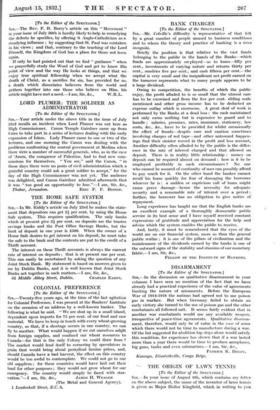DISARMAMENT [To the Editor of the SPECTATOR.] SIR, —In the discussion
on qualitative disarmament in your columns I have seen no mention of the fact that we have already had a practical experience of the value of agreements limiting the nature of armaments. Before the European War of 1914-1918 the nations had agreed not to use poison gas in warfare. But when Germany failed to obtain an early victory she turned to the use of poison gas and the other combatants all followed suit. It seems fairly evident that in another war combatants would use any available weapon, Irrespective of peace-time agreements. Qualitative disarma- ment, therefore, would only be of value in the case of arms which there would not be time to manufacture during a war. Of the list suggested for abolition big ships alone would satisfy this condition, for experience has shown that if a war lasted more than a year there would be time to produce aeroplanes, big guns, tanks and even submarines.—I am, Sir, &c., Kasenga, Elisabethville, Congo Beige, PATRICK K. DixoN.






























 Previous page
Previous page